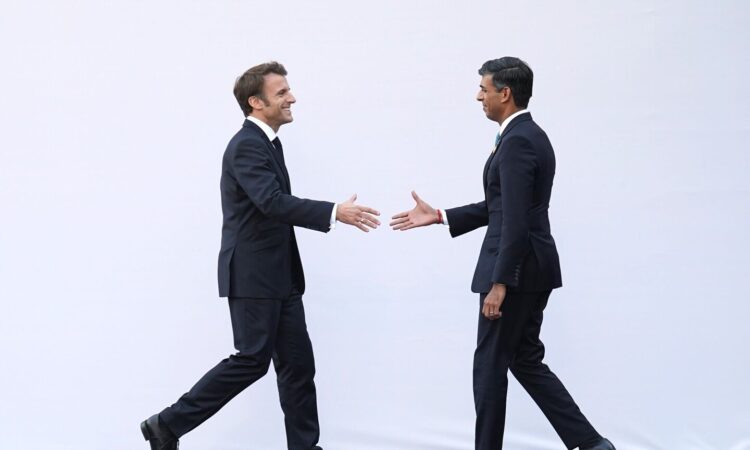
Similar forces are at work today as two Brexit frenemies — France’s Emmanuel Macron and the UK’s Rishi Sunak — attempt to unthaw ice-cold relations amid a resurgent Germany, a dominant US, a bellicose Russia and a global institutional framework that’s showing cracks from the United Nations to the World Trade Organization. This week’s Franco-British summit will be the first of its kind since 2018, and there’s desire on both sides for what former ambassador Sylvie Bermann calls an encouraging “reset” between two very similar countries — but also a few risks.
Sunak’s olive branch after the Liz Truss era — a time when France was described as both friend and foe — is a clear bid for rapprochement with the European Union, as highlighted by the recent defusing of tensions over Northern Ireland border arrangements. The UK’s Brexit isolation has been less than splendid, raising trade barriers with the EU and worsening inflationary pressures without delivering a more profitable US relationship. It’s certainly put Britain at risk of being pushed around by bigger neighbors. In a time of war, social unrest, and a subsidy race among superpowers, it makes sense to look for partners.
If Macron is grasping the branch rather than knocking it away — as any decent disciple of Charles de Gaulle might — it’s because Paris also feels isolated. The Franco-German “engine,” which initially delivered a united response to Brexit, is now stalling. A resurgent Germany is rattling France, as Berlin defends its national corporate and trade interests in a host of policy areas. Relations with Italy have also suffered after Mario Draghi’s departure. While the Franco-German relationship remains key to Europe, there’s a feeling in Paris that now is the right time to repair ties with the UK.
Helpfully, the UK and France look more alike than they used to. The nadir of Brexit saw Franco-German interests overlap, but war and inflation have made London and Paris look more like the geopolitical twins that their similar armies, nuclear capabilities, demographics and economies suggest they are. The UK might look nervously at India’s economic leap-frog as one warning sign; France might see Germany’s as another. Macron and Sunak also have very similar backgrounds — alumni of Goldman Sachs Group Inc. and Rothschild & Co., they’ve had stratospheric political ascents, both blending pragmatism and populism as they figured out when to step into the limelight as leaders in the face of chaos.
Yet resets are also hard. Sharing a border, even a maritime one, is rarely fun, and Brexit has made it worse. The UK has made it a priority to ask for more help from Paris to stop migrant crossings in small boats across the English Channel; yet this is likely to fall on deaf ears so soon after the previous deal extended a years-long status quo whereby the UK sends money to France to increase surveillance. Much higher on the agenda for Paris are military marine-craft, after the humiliating AUKUS alliance between Australia, the US and UK lost it a lucrative submarine contract.
Finding common ground will be a long process, therefore. Nuclear energy is one option: It’s an issue close to Macron’s heart and the UK is more alive to its possibilities than Germany. Security and defense may also provide fertile ground, given existing military cooperation agreements between the UK and France signed in 2010 have been left to wither. Support for Ukraine would benefit from a more invested Franco-British alliance. On financial services, a memorandum of understanding between the UK and the EU should open the door for closer co-operation, though it’s far too early to expect more.
Neither side should expect too much from this week’s meeting. Sunak has yet to be tested at the ballot box and has an uphill struggle to unite his fractious party. And Macron has no incentive to go back to the pre-Brexit days of allowing the City to dominate finance. Still, at a time of global insecurity, this is a step in the right direction. “The British are a pain in the backside — but we must keep contact,” as Jean-Louis Bourlanges, a former member of the European Parliament, said in December 2020. The balance of power is worth maintaining.
More From Bloomberg Opinion:
• Sunak’s Tough Talk Won’t Stop Migrant Boats: Therese Raphael
• Brexit Could Have Been Avoided With Deals Like This: Clive Crook
• UK’s Political Fever Dreams May Finally Be Over: Martin Ivens
This column does not necessarily reflect the opinion of the editorial board or Bloomberg LP and its owners.
Lionel Laurent is a Bloomberg Opinion columnist covering digital currencies, the European Union and France. Previously, he was a reporter for Reuters and Forbes.
More stories like this are available on bloomberg.com/opinion



